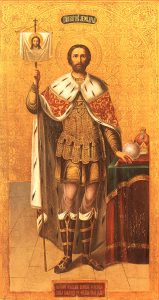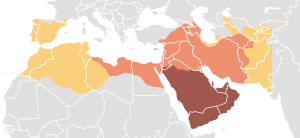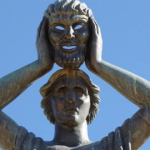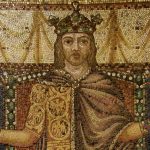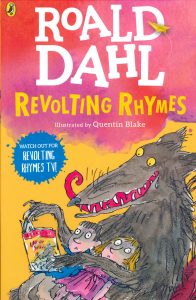History, Holidays & Observances – November 23
A look at some of the history and holidays on November 23
 Holidays & Observances on November 23
Holidays & Observances on November 23
Repose of Alexander Nevsky: Nevsky was a deeply religious Russian Orthodox Prince of Novgorod, a skilled politician and a successful military commander during the 13th century, a time when his kingdom was being overrun by the Mongolian Golden Horde from the East, and under attack by Teutonic Knights from the West. His story is long and a bit convoluted, though quite interesting. His story is told from the perspective of the Russian Orthodox Church here.
 Major Events on November 23
Major Events on November 23
1248 – Reconquista of Spain: Muslims surrender Seville
As the colored areas of the map above shows, during the first 148 years after the death of Mohammed, between 622 and 750, Muslims spread their religion by the sword to the West, reaching all of the way to India, and to the East across all of North Africa and, in Europe, they conquered most of Spain as well in between 711 and 788, the so-called Umayyyad Caliphate conquest of Hispania. But for the great French Duke Charles Martel, who in 732 decisively defeated an Islamic army invading from Spain into France at the Battle of Tours, all of Europe would have been conquered.
As to the Umayyad conquest of 8th century Spain, only Pelagius the Christian Visigoth King in a small area of the north, withstood the Muslim onslaught. The Reconquista of Spain by Christian forces is dated from Pelagius’s defeat of an attacking Muslim slave army at the Battle of Covadonga circa 722. The Reconquest in Spain took over 700 years as Christian forces drove back the Muslim invaders one stronghold at a time.
Today’s date in 1248 marked a major event in the Reconquista. In July of 1247, a Christian army led by King Ferdinand III of Castile had laid siege to the Muslim controlled city of Seville. On this date in 1248, the Muslim ruler of the town surrendered, This completed the reconquest of most of Spain, with the lone holdout being the Muslim enclave of Granada in the south. That would fall to the forces of Ferdinand and Isabella in 1492.
That is not the end of the story. As radical Islamists see it, any territory once conquered by Muslim invaders must remain Islamic. Jihad is justified to retake such lands. In 2001, al Qaeda justified terrorism in the West in part as a legitimate response to Christian “aggression” for cleansing Islam from al-Andalus (Islamic Spain) more than half a millennium earlier. As Austin Bay stated in 2004:
Spain was an Islamist target before 9-11. . . . For Islamists, 1492 isn’t the year Columbus “discovered” America, it’s the year Spain completed the “reconquista” — the elimination of Iberia’s Moorish (Muslim) states. Osama bin Laden bitterly lamented the loss of Al Andalus (Spain). His claims of “humiliation” resonated with European leftists. . . .
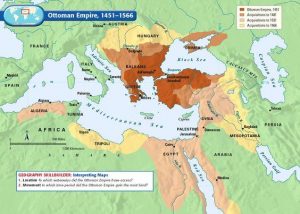 1510 – First campaign of the Ottoman Empire against the Kingdom of Imereti (modern western Georgia)
1510 – First campaign of the Ottoman Empire against the Kingdom of Imereti (modern western Georgia)
The Ottoman Empire became the dominant force in Islam between the 15th and early 20th century. They came to rule over much of the already Islamic world of prior caliphates and imposed Islam by the sword in vast new conquests. “During the 16th and 17th centuries, at the height of its power under the reign of Suleiman the Magnificent, the Ottoman Empire . . . controll[ed] most of Southeast Europe, parts of Central Europe, Western Asia, parts of Eastern Europe and the Caucasus, North Africa and the Horn of Africa.” Their most potent force were the Jannisaries, Europe’s first standing army composed entirely of captured Christian slaves impressed as boys into the Caliph’s army where they served for life.
Ottoman armies began invading the Kingdoms in Georgia in the early 16th century. In their first campagin against the Kingdom of Imereti, Ottoman soldiers on this day in 1510 sacked the capital city of Kutaisi, and burned to the ground the Gelati Monastery, one of the oldest Orthodox Christian monasteries in Georgia. The Ottoman’s ended their invasion when the Christian King of Imerti agreed to become a vassal state of the Ottomans. That would last until 1703, when Imerti rebelled against Ottoman influence and an Ottoman invasion of Imerti failed.
1644 – John Milton publishes Areopagitica challenging censorship
John Milton was an important English poet whose most famous literary work is the epic poem Paradise Lost. His most famous political work was the pamphlet, Areopagiticia, an endorsement of freedom of speech and against press censorship As Milton eloquently states in the pamphlet: “Give me the liberty to know, to utter, and to argue freely according to conscience, above all liberties.”
Milton was a Puritan who strongly supported Parliament during the English Civil War (1641-1652) In 1649, was hired by Oliver Cromwell into his government to translate correspondence and to write propaganda on behalf of the regime. In essence, he was a 17th century equivalent of a press secretary.
But before that, in 1644, with the Civil War raging, Milton found himself at odds with Parliament over a law they had passed allowing the government to censor publications. Milton’s response to that was to write a speech on the matter, a speech he also had published on this date in 1644 and distributed publicly, Areopagiticia; A speech of Mr. John Milton for the Liberty of Unlicenc’d Printing, to the Parlament of England.
This issue was personal for Milton, as he had suffered censorship himself in his efforts to publish several tracts defending divorce (a radical stance which met with no favour from the censors). Areopagitica is full of biblical and classical references which Milton uses to strengthen his argument. This is particularly fitting because it was being addressed to the Calvinist Presbyterians who comprised Parliament at that time.
According to George H. Sabine, the Areopagitica presumed and was written for an engaged public:
“Its basic principle was the right and also the duty of every intelligent man as a rational being, to know the grounds and take responsibility for his beliefs and actions. Its corollary was a society and a state in which decisions are reached by open discussion, in which the sources of information are not contaminated by authority in the interest of party, and in which political unity is secured not by force but by a consensus that respects variety of opinion.“
Areopagiticia was influential in the creation of the First Amendment prohibitions, that “Congress shall make no law . . . abridging the freedom of speech, or of the press.” Moreover, Milton’s Areopagiticia has been cited on several occasions in Supreme Court decisions interpreting those clauses.
At the time of Milton and well into the Information Age in which we now exist, it was only the government that had the power to effectively censor ideas. At the start of the Information Age, and particularly with the dawn of the internet, many naive people opined that the internet would be the final nail in the coffin of censorship as everyone would have a voice. The opposite has come to pass. Large ideologically motivated corporations such as Google, Facebook and Youtube dominate the internet and impose progressive censorship on conservative speech and ideas. It is an obscenity that they are allowed to do that and it presents perhaps the greatest threat to freedom and democracy we face.
 Notable Events On November 23
Notable Events On November 23
534 BC – A star (and the word “thespian”) is born when Thespis of Icaria becomes the first recorded actor to portray a character onstage.
1733 – One of three major Caribbean slave revolts in the 18th century began this day in 1733 on St. John in what was then the Danish West Indies. It loomed large in the minds of slave owners in America, particularly in South Carolina where the slave population was significantly larger than the free population.
1924 – Edwin Hubble’s discovery, that the Andromeda “nebula” is actually another island galaxy far outside of our own Milky Way, is first published in The New York Times.
1963 – The BBC broadcasts the first episode of An Unearthly Child (starring William Hartnell), the first story from the first series of Doctor Who, which is now the world’s longest running science fiction drama. Dr. Who was a very entertaining show for many years, until just in the last few years when its writers became fully woke and turned the show into a soapbox for leftist polemic.
1993 – Rachel Whiteread proves that beauty is in the eye of the beholder. In 1993, she won both the £20,000 Turner Prize award for best British modern artist and the £40,000 K Foundation art award for the worst artist of the year.
 Born on November 23
Born on November 23
912 – Otto I, a 10th century Holy Roman Emperor who significantly consolidated Germany, successfully defended his lands from a pagan Magyar invasions, and wrestled power over German clerics from the Papacy.
1190 – Pope Clement IV, a very liberal thinker who, when he occupied the Papacy, was a patron of both the great Church philosopher, Thomas Aquinas and the creator of the scientific method, Roger Bacon. Indeed, it was Clement IV who encouraged Bacon to write Opus Majus, which included important treatises on optics and the scientific method.
1749 – Edward Rutledge, who, along with his older brother, John, played central roles in the American Revolution and South Carolina politics. Edward Rutledge was the youngest signer of the Declaration of Independence and later became Governor of South Carolina.
 Died on November 23
Died on November 23
1990 – Roald Dahl, prolific British novelist, poet, and screenwriter whose words have sold over 250 million copies worldwide.
The poem below, Three Little Pigs, was published in Revolting Rhymes, a collection of six Roald Dahl poems published in 1982. Each poem is a parody of a traditional folk tale. He provides a re-interpretation and surprise ending instead of the traditional happily-ever-after ending. In this poem with gory twists, Roald Dahl combines the characters in the Three Little Pigs story with Little Red Riding Hood.
The Three Little Pigs
The animal I really dig,
Above all others is the pig.
Pigs are noble. Pigs are clever,
Pigs are courteous. However,
Now and then, to break this rule,
One meets a pig who is a fool.
What, for example, would you say,
If strolling through the woods one day,
Right there in front of you you saw
A pig who’d built his house of STRAW?
The Wolf who saw it licked his lips,
And said, ‘That pig has had his chips.’
‘Little pig, little pig, let me come in!’
‘No, no, by the hairs on my chinny-chin-chin!’
‘Then I’ll huff and I’ll puff and I’ll blow your house in!’The little pig began to pray,
But Wolfie blew his house away.
He shouted, ‘Bacon, pork and ham!
Oh, what a lucky Wolf I am!’
And though he ate the pig quite fast,
He carefully kept the tail till last.
Wolf wandered on, a trifle bloated.
Surprise, surprise, for soon he noted
Another little house for pigs,
And this one had been built of TWIGS!‘Little pig, little pig, let me come in!’
‘No, no, by the hairs on my chinny-chin-chin!’
‘Then I’ll huff and I’ll puff and I’ll blow your house in!’The Wolf said, ‘Okay, here we go!’
He then began to blow and blow.
The little pig began to squeal.
He cried, ‘Oh Wolf, you’ve had one meal!
Why can’t we talk and make a deal?
The Wolf replied, ‘Not on your nelly!’
And soon the pig was in his belly.‘Two juicy little pigs!’ Wolf cried,
‘But still I’m not quite satisfied!
I know how full my tummy’s bulging,
But oh, how I adore indulging.’
So creeping quietly as a mouse,
The Wolf approached another house,
A house which also had inside
A little piggy trying to hide.
‘You’ll not get me!’ the Piggy cried.
‘I’ll blow you down!’ the Wolf replied.
‘You’ll need,’ Pig said, ‘a lot of puff,
And I don’t think you’ve got enough.’
Wolf huffed and puffed and blew and blew.
The house stayed up as good as new.
‘If I can’t blow it down,’ Wolf said,
I’ll have to blow it up instead.
I’ll come back in the dead of night
And blow it up with dynamite!’
Pig cried, ‘You brute! I might have known!’
Then, picking up the telephone,
He dialed as quickly as he could
The number of red Riding Hood.‘Hello,’ she said. ‘Who’s speaking? Who?
Oh, hello, Piggy, how d’you do?’
Pig cried, ‘I need your help, Miss Hood!
Oh help me, please! D’you think you could?’
‘I’ll try of course,’ Miss Hood replied.
‘What’s on your mind…?’ ‘A Wolf!’ Pig cried.
‘I know you’ve dealt with wolves before,
And now I’ve got one at my door!’‘My darling Pig,’ she said, ‘my sweet,
That’s something really up my street.
I’ve just begun to wash my hair.
But when it’s dry, I’ll be right there.’A short while later, through the wood,
Came striding brave Miss Riding Hood.
The Wolf stood there, his eyes ablaze,
And yellowish, like mayonnaise.
His teeth were sharp, his gums were raw,
And spit was dripping from his jaw.
Once more the maiden’s eyelid flickers.
She draws the pistol from her knickers.
Once more she hits the vital spot,
And kills him with a single shot.
Pig, peeping through the window, stood
And yelled, ‘Well done, Miss Riding Hood!’Ah, Piglet, you must never trust
Young ladies from the upper crust.
For now, Miss Riding Hood, one notes,
Not only has two wolfskin coats,
But when she goes from place to place,
She has a PIGSKIN TRAVELING CASE.
